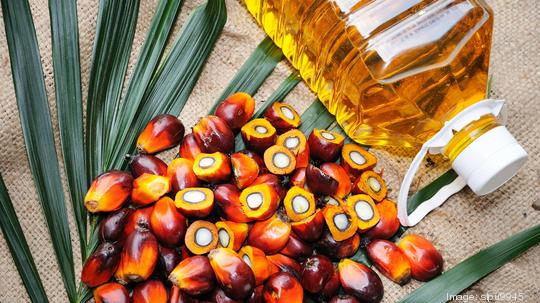
Between 1990 and 2013, global production of palm oil more than quadrupled, rising from 14.5 million tons to 67.3 million tons. And that number is expected to be 128.20 million tons by 2022, making the global palm oil industry worth $88 billion. This comes, however, with irreversible damage to the environment -- Palm oil acreage worldwide increased from 15 million acres in 1990 to more than 46 million acres in 2014, mostly concentrated in tropical forests. And all of us contribute to this damage on a daily basis just by buying daily essentials that contain palm oil like bread, shampoo, soaps, ice cream, and chocolate.
The world needs an alternative to palm oil and a Boston startup has a solution. C16 Biosciences, which has graduated from accelerators Greentown Labs, in Somerville, and YCombinator, in Silicon Valley, makes a lab-grown alternative to palm oil, which it claims is 20% cheaper and isn’t destructive.
Using synthetic biology, the C16 team was able to create a viable alternative to palm oil by using yeast, that grows in tap water, and giving it a feedstock or carbon source to multiply.
"We are focused on developing products where we people don’t have to compromise on the properties of palm oil at an affordable cost," said CEO Shara Ticku. C16 knows that the market exists -- palm oil is the world's most widely consumed vegetable oil and one that cannot be replaced easily, thanks to Vitamin E and beta-carotene.
Palm oil is also one of the few highly saturated vegetable fats, used in a variety of daily household products like creams, soaps and pizza bases. But, at the same time, the palm oil industry has turned many against it by causing destruction to tropical biodiversity. And the consumer packaged goods industry including household names like Nestle, Mondelez, Unilever, Danone and General Mills have pledged to use deforestation-free palm oil or sustainable palm oil.
While C16 knows that it cannot replace tropical palm oil production with its lab-grown substitute overnight, it's concentrating all efforts towards creating a viable product for a portion of the market, starting with the skincare industry. "Beauty and skincare industry is increasingly aware of how much palm oil they use," Ticku said.
And as buyers become aware of their consumption choices, more companies will be forced to fall in line with this demand. Vegan and cruelty-free cosmetics are already creating big waves in the beauty industry.
C16's team of four bioscientists and engineers is working with contract manufacturers to meet its production capacity of a thousand metric tonne in two years while trying to save the endangered Sumatran Orangutan.








